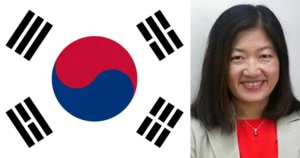UWM has added a new minor in Korean studies to its offerings.
The university has long had a Korean program that offered language classes for interested students, but this school year marks the inception of a minor degree in Korean studies. UWM students in the Korean program have been waiting a long time to be able to declare such a minor, said Sooho Song, an associate professor and co-coordinator of the Korean language program.
“From the moment I joined teaching Korean language, the students have been asking to create … the minor. At the time, they just took Korean language courses because they really liked it,” Song said. She estimates that eight students have already declared a minor in Korean studies, with five who will graduate with their minor this spring. Even more students are interested in declaring next year, Song added.
Two students who have already declared minors include Olivia King and Jazmine Scott. Both became interested in learning Korean through Korean music and television.
“I’m truly excited to have Korean studies as a minor,” Scott said. Though she is majoring in Latin American, Caribbean, and U.S. Latinx studies, she thinks having a Korean studies minor will turn into a major benefit. “Korean is not an easy language by any means, but having it as a minor shows dedication, a willingness to learn, and cultural diversity. Additionally it separates you from others as Korean is a very unique and niche language to learn,” Scott added.
The minor requires that students take six semesters of Korean language classes up into the 300-level, as well as six credits of additional coursework. That includes Korean 221, “Korean Culture and Society.” Students can also fulfill some of their credits by studying abroad and applying for a waiver.
The minor couldn’t come at a better time. UWM has joined a growing number of universities across the United States that are establishing majors and minors in Korean.
“Already 54 universities in the United States have created a Korean minor. This is not only us,” Song said. “We have to make our students (able) to compete with them when they apply for jobs in international corporations.”
And there will be competition for those jobs, Song added. Korea is a growing global power with the world’s 10th-largest economy in terms of GDP. Its technology sector is growing with companies like Samsung and Hyundai leading the way.
“You can tell they need a lot of people who can work in international trade and business. Their businesses are growing,” Song said. And, she added, the U.S. State Department and security services will likely be looking to recruit graduates of Korean programs. “Critically, with the North Korean nuclear threat, we need people who really understand Korean culture and Korean society better,” she said.
Plus, King noted, having experience speaking any foreign language is attractive to prospective employers. “I think it will be helpful in my future career! I want to do something that has to do with languages, so I think them seeing that I can speak another will be helpful,” she said.
Many students like King and Scott have already been exposed to Korean culture as a matter of course. Song says a “Korean Wave” has begun spreading the country’s culture around the world through popular media. Americans and other people around the world are hungry for everything from the K-Pop genre of music, including the wildly successful band BTS, to Korean movies and television dramas. You may have watched the Korean show “Squid Game” on Netflix last year, or applauded when the Korean film “Parasite” won four Oscars at the 2020 Academy Awards, including for Best Picture, Best Director, and Best Screenplay.
All of that popular media is driving interest in the country’s culture – and may lead to job opportunities within Korea’s entertainment industry.
“Even 10 years ago, who would imagine a movie produced by a Korean director in Korea would be able to get an Oscar, let alone ‘Best Picture?’” Song asked. “But it’s happening. I believe it will last for a while, and it will create more jobs and more opportunities for the students.”
Students who are interested in declaring a Korean studies minor can visit the program’s website for more information or speak with their advisor about the process. Some of Song’s former students are a bit miffed that they missed their opportunity to complete the minor, she said with a laugh.
Most importantly, UWM’s program will give students a competitive edge as they explore career options in international business, technology, entertainment, or government.
“Although they are not perfectly fluent in Korean, they understand Korean culture,” Song said of her students. “There have been foreign people who are employees in Korea for a while, but a lot of them didn’t understand Korea before they came. It created a conflict, sometimes. We definitely need people who have studied properly about Korea and understand Korea, love Korea, know a pretty good level of language and understand the nature of Korea.”
By Sarah Vickery, College of Letters & Science
